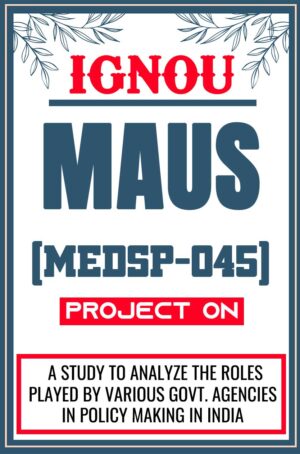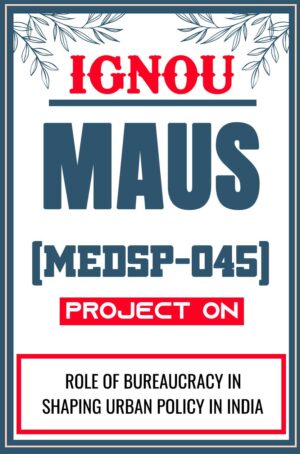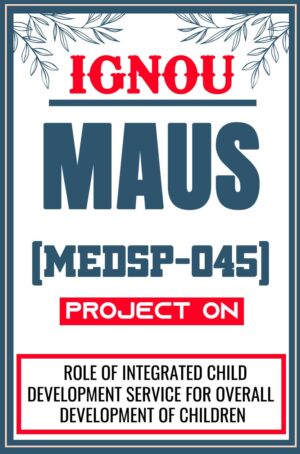Buy IGNOU MAUS Project for MEDSP 045
The IGNOU MAUS (Master of Arts in Urban Studies) Project for MEDSP 045 is a critical component of the MAUS program, focusing on practical application and research in urban studies. The MAUS project is designed to enable students to engage in fieldwork, analyze real-world urban issues, and develop solutions based on theoretical frameworks learned during the course.
Whatsapp us to get the Personalized (Customized) IGNOU MAUS Project Report and Synopsis
Download PDF Link for IGNOU MAUS Project (MEDSP 045)
IGNOU MAUS Project specifically deals with urban development, policies, and planning, encouraging students to explore areas like sustainable urban growth, infrastructure, housing, and socio-economic challenges in urban environments.
Successful completion of the IGNOU MAUS Project demonstrates a student’s ability to critically assess urban challenges and propose viable solutions, making it a valuable part of their academic and professional development in urban planning and development.
How does the IGNOU MAUS Project contribute to your overall understanding of urban studies?
The IGNOU MAUS (Master of Arts in Urban Studies) Project for MEDSP-045 improves your comprehensive understanding of urban studies by combining academic knowledge and practical application. This is how it contributes:
- Real-World Application: This project allows you to investigate real-world urban challenges like housing, transit, and urban governance. Fieldwork and study provide a more in-depth understanding of how urban theories are used in practice.
- Problem-Solving Skills: You’ll learn how to identify and assess urban concerns like population growth, resource management, and sustainability. The project fosters critical thinking and the development of realistic solutions to these difficulties, which will help you improve your problem-solving skills.
- Interdisciplinary Perspective: Urban studies encompass a variety of disciplines, including sociology, economics, and environmental studies. The project assists you in integrating these perspectives, providing a comprehensive understanding of how cities operate and how many elements influence urban development.
- Research Competency: Conducting in-depth research improves your methodological skills, allowing you to collect, analyze, and present data effectively.
- Policy grasp: You’ll learn about urban policies and development methods, expanding your grasp of how decisions affect city planning and growth.
Samples of IGNOU MAUS Project topics for MEDSP 045
- Role Of Integrated Child Development Service For Overall Development Of Children
- Role Of Non-Government Organizations (NGOS) In Disaster Management
- Role Of Bureaucracy In Shaping Urban Policy In India
- A Study To Analyze The Roles Played By Various Government Agencies In Policy Making In India
- Health Status Of Pre- School Children In Urban Slums
Tips for Crafting Your IGNOU MAUS Project
- Consistency and Clarity: Make sure your report is coherent, well-structured, and easy to understand.
- Quality research and planning: Support your project with dependable methods and modern urban theories.
- Originality: Your project should incorporate your own thoughts and urban planning concepts.
- Ethical Guidelines: Ensure that research and urban analysis are conducted in accordance with ethical norms.
- Proofreading: Check your work for accuracy and verify it meets academic standards.
Are there any specific guidelines or criteria to consider when selecting a topic for the IGNOU MAUS Project?
When choosing a topic for the MAUS Project, it is critical to adhere to specified standards and criteria to ensure that the topic is consistent with the program’s objectives. Here are the major considerations:
- Relevance to Urban Studies: The topic must have a direct connection to urban issues such as city planning, government, infrastructure, housing, transportation, or environmental sustainability. It should be consistent with the ideas discussed throughout the MAUS courses.
- Feasibility and Scope: Choose a topic that can be completed within the time and resources available. Make sure you have access to appropriate data, fieldwork opportunities, and research materials. Avoid extremely wide or intricate topics that may be difficult to accomplish.
- Research Potential: The issue should provide opportunities for relevant research and analysis. It should enable you to apply theoretical knowledge, perform fieldwork, and contribute new perspectives or solutions to urban problems.
- Social and Economic Impact: Concentrate on subjects that address major urban issues affecting the population, such as urban poverty, inequality, or environmental concerns, and evaluate their social and economic consequences.
- Personal Interest and Career Relevance: Choose a topic that interests you and corresponds to your career objectives. A topic that you are passionate about will keep you motivated throughout the process.
- Choose a topic that examines current trends, emerging difficulties, or novel approaches to urban planning, such as smart cities, sustainable urbanization, or public-private partnerships.
How does the IGNOU MAUS Project relate to the specific focus on urban planning and development?
The MEDSP-045 project in the IGNOU MAUS program is strongly related to urban planning and development since it requires students to engage with real-world urban issues and use theoretical knowledge to provide answers. Here’s how the project is related to urban planning and development:
1. Practical Application of Urban Planning Theories:
- The project requires you to use the theories you learned throughout the semester. Land use, zoning, transportation, and infrastructure development are all important aspects of urban planning, and this project will allow you to see how these concepts are applied in real-world communities.
2. Analysis of Urban Development Issues:
- The MAUS project addresses current difficulties in urban development, including housing shortages, sprawl, sustainability, and smart city projects. Selecting a research topic in these areas allows you to study development concerns, identify their causes, and investigate potential remedies that improve urban quality of life.
3. Sustainability and Urban Growth:
- Sustainable development is a priority in modern urban planning. The project may require you to research environmental sustainability topics such as green infrastructure, renewable energy in cities, and strategies for sustainable urban growth. Understanding these components allows you to see how cities might flourish while reducing negative environmental impacts.
4. Public Policy and government:
- Urban planning and development are closely linked to government systems and public policies. The project allows you to investigate how government policies at the municipal, regional, and national levels affect urban growth. You could research topics such as affordable housing programs, transit planning, or public-private partnerships in infrastructure development.
5. Fieldwork and Case Studies:
- Conducting fieldwork or case studies in your study allows you to analyze specific urban regions or development projects. This gives you practical experience reviewing urban planning efforts, analyzing their success, and making recommendations for changes.
What are some potential career paths that you can pursue after completing the IGNOU MAUS Project?
After completing the Master of Arts in Urban Studies (MAUS) program, various career paths become available, particularly in areas related to urban planning, development, and management. Here are some potential career options:
Urban Planner:
- Role: Urban planners develop land-use plans and programs to create communities, accommodate population growth, and revitalize physical facilities. They work with government agencies, developers, and the public.
- Where: Local governments, urban development agencies, and private consulting firms.
- Skills Needed: Knowledge of zoning regulations, community planning, and environmental sustainability.
City or Municipal Manager:
- Role: City managers oversee the administrative functions of a city, ensuring that urban policies are implemented effectively. They manage budgets, coordinate city departments, and work on public safety and infrastructure projects.
- Where: Local governments, municipal corporations.
- Skills Needed: Leadership, governance, public administration, and budgeting.
Housing and Community Development Officer:
- Role: Focuses on affordable housing projects, community development programs, and urban renewal. These professionals work to improve housing conditions and foster community growth.
- Where: Nonprofits, government agencies, and housing authorities.
- Skills Needed: Knowledge of housing policies, urban renewal, and social services.
Environmental Planner:
- Role: Environmental planners ensure that urban development projects comply with environmental regulations. They focus on sustainable development, pollution control, and preserving natural habitats.
- Where: Environmental consulting firms, government agencies.
- Skills Needed: Environmental laws, sustainability principles, and impact assessment.
Transportation Planner:
- Role: Transportation planners develop efficient, safe, and sustainable transportation networks, including public transit, roads, and bicycle paths. They address issues like traffic congestion, public transport, and urban mobility.
- Where: Government agencies, transportation authorities, and consulting firms.
- Skills Needed: Transportation infrastructure, GIS, and traffic management.
Urban Policy Analyst:
- Role: Urban policy analysts study the effects of government policies on urban areas, providing recommendations on issues such as housing, transportation, and economic development.
- Where: Think tanks, government agencies, research institutions.
- Skills Needed: Policy analysis, data interpretation, and socio-economic research.
Real Estate Development Consultant:
- Role: Work on urban real estate projects, assessing land-use viability, project profitability, and community impact. They often bridge the gap between real estate developers and local governments.
- Where: Private real estate firms, consulting companies.
- Skills Needed: Knowledge of urban markets, zoning laws, and financial modeling.
GIS Specialist:
- Role: Geographic Information Systems (GIS) specialists use spatial data to analyze urban growth, transportation networks, and land use. Their work supports decision-making in urban planning and environmental conservation.
- Where: Urban planning agencies, environmental firms, and private sector.
- Skills Needed: GIS software, spatial analysis, and data visualization.
Nonprofit or NGO Manager:
- Role: Many NGOs and nonprofit organizations focus on urban issues, such as affordable housing, community development, and poverty reduction. Managers coordinate these programs and advocate for policy changes.
- Where: NGOs, nonprofits, international organizations.
- Skills Needed: Program management, advocacy, and policy expertise.
Academia and Research:
- Role: If you are interested in research and teaching, you can pursue a career in academia, contributing to urban studies research and educating future urban planners and policymakers.
- Where: Universities, research institutions.
- Skills Needed: Research skills, urban theory, and teaching capabilities.
Sustainability Consultant:
- Role: Advises cities and businesses on how to implement sustainable practices in urban development projects, focusing on reducing environmental impact, energy efficiency, and green building.
- Where: Consulting firms, environmental agencies.
- Skills Needed: Knowledge of sustainability standards, green technology, and environmental laws.
Ready to get your IGNOU MAUS Project Report and Synopsis Sample PDF for MEDSP 045?
- Call us or WhatsApp us at: 9958947060, 9354637830
- Visit: SHRICHAKRADHAR.COM
-
Sale!

-
Sale!

IGNOU MAUS Project (MEDSP-045) Synopsis/Proposal & Project Report/Dissertation in Hard-Copy (Sample-4)
Original price was: ₹499.00.₹249.00Current price is: ₹249.00. -
Sale!

IGNOU MAUS Project (MEDSP-045) Synopsis/Proposal & Project Report/Dissertation in Hard-Copy (Sample-3)
Original price was: ₹499.00.₹249.00Current price is: ₹249.00. -
Sale!

IGNOU MAUS Project (MEDSP-045) Synopsis/Proposal & Project Report/Dissertation in Hard-Copy (Sample-2)
Original price was: ₹499.00.₹249.00Current price is: ₹249.00. -
Sale!

IGNOU MAUS Project (MEDSP-045) Synopsis/Proposal & Project Report/Dissertation in Hard-Copy (Sample-1)
Original price was: ₹499.00.₹249.00Current price is: ₹249.00.





